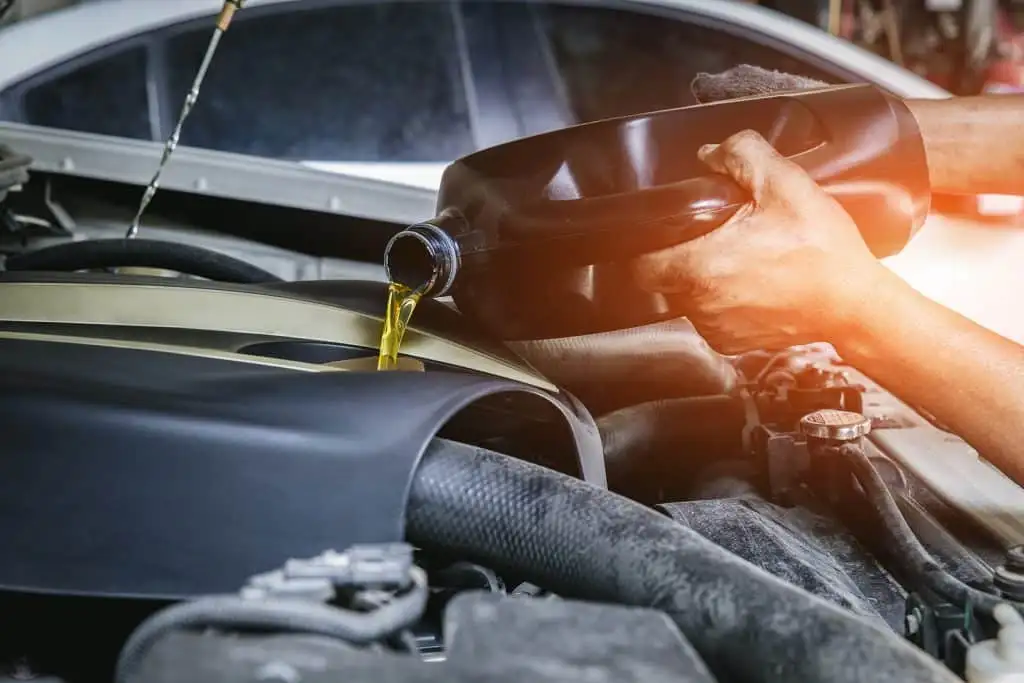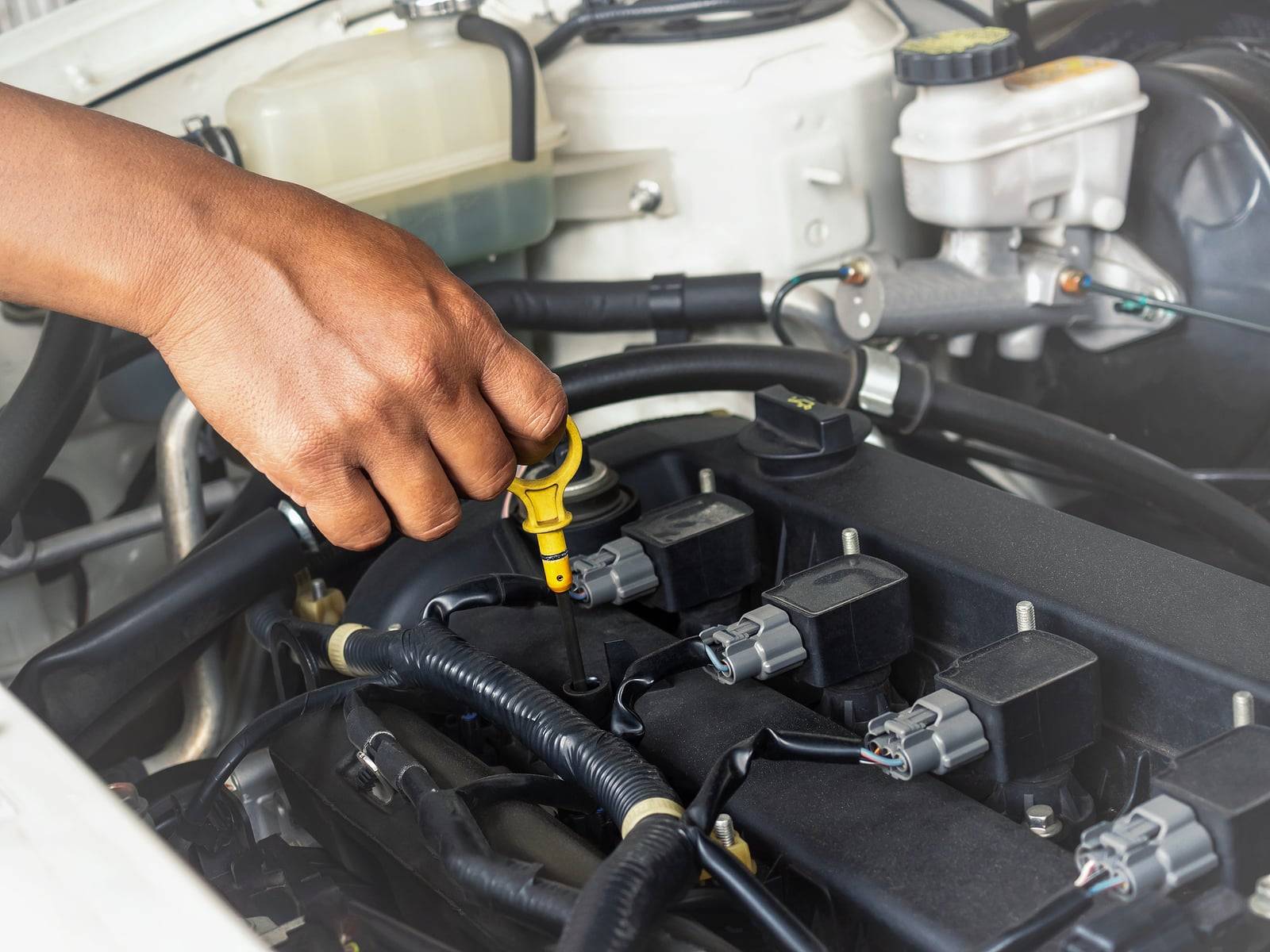Jiffy Lube scams and oil change scams have been around for as long as automobiles. It is a Buyer beware situation when it comes to finding someone to change your oil. Car Dealerships, oil change garages, and Jiffy Lube stations have long been associated with shady scam dealings.
Table of Contents
Consumers in the United States have fallen victim to various schemes ranging from switching auto parts to manufacturing vehicle problems like spraying coolant on the floor and claiming hose leaks. And it’s not restricted to quick oil change shops either. There are plenty of dealership service scams to keep an eye out for as well.
Oil Change Scams And Jiffy Lube Scams Buyer Beware
Scam Advice: Your vehicle only needs the scheduled maintenance according to the owner’s manual. Check with the owner’s manual whenever someone tells you that this or that needs changing, and ask why their information does not match the manual. Then watch their face and make your decision.
If you think it’s only sleazy, hole-in-the-wall, quick oil change shops pulling possible scams on customers, think again. Jiffy Lube, one of North America’s most well-known oil change franchises, has been accused countless times of cheating customers. It’s also worth noting that Shell, the second-biggest oil company globally, owns Jiffy Lube.

However, it didn’t stop dozens of Jiffy Lubes in California from scamming and lying to customers.
Things had gotten so bad that an undercover investigation was launched to get to the bottom of things. Five months and over 30 clandestine visits later, California ended up fining Jiffy Lube $220,000 for doing all sorts of stuff including lying about people’s engine oil being low when it was fine, doing needless transmission flushes, claiming to have a trick that improved miles per gallon (MPG) when they had no such skill, and the list goes on and on.
One would think that something as simple as an oil change could lead to you getting scammed, but where ever there is a buck to be made, a scammer is waiting to get over on unsuspecting consumers. This article covers four common oil change scams that are were trending in 2019, and you should avoid in 2020.
Jiffy Lube Scams in California
However, it didn’t stop dozens of Jiffy Lubes in California from allegedly scamming and lying to customers. Jiffy Lube scams have been reported in almost every state; however, California is an extreme example. Things had gotten so bad that an undercover investigation was launched to get to the bottom.
Five months and over 30 clandestine visits later, California fined Jiffy Lube $220,000 for doing all sorts of stuff, including lying about people’s engine oil being low when it was fine. They were also proven to do needless transmission flushes, claiming to have a trick that improved miles per gallon (MPG) when they had no such skill, and the list goes on and on.
How to Avoid Jiffy Lube Scams and Oil Change Scams
One would think that something as simple as an oil change could lead to you getting scammed, but where ever there is a buck to be made, a scammer is waiting to get over on unsuspecting consumers. This article covers four common oil change scams that were trending in 2022 and that you should avoid in 2023.
They Tell You to Come Back in 3,000 Miles
One of the favorite scams an automotive shop likes to pull on vehicle owners is convincing them they should return within a certain period or at a specific mile marker. Concerning quick lube shops, this is likely the number one scheme they use to bring extra income.
Advances in new fully synthetic motor oils can last between 6,000 to 10,000 miles before it needs to be changed. More expensive brands stay up to 15,000 miles or more, depending on how often and hard you drive your vehicle. And if you are a penny pincher and use the cheapest conventional synthetic oil, you still shouldn’t have to change it for at least 5,000 miles for most vehicles.
The “come back in 3,000 miles” scam is usually accompanied by an official-looking sticker on your windshield, stating that you need to return after 3,000 miles for another oil change. As mentioned above: unless you’re a drag racer or traveling from New York City to L.A. every month, there is no reason for the average vehicle owner to change their oil more often than recommended in your owner’s manual.
Furthermore, in your owner’s manual, you’ll likely find a warning stating that oil changes at 3,000-mile intervals are too frequent.
Another thing to remember is that the condition of the oil is more of a sign that it may need changing than how many miles you’ve driven. Take time to look and feel the oil sample on the end of the dipstick yourself.

Car Dealer and Oil Change
Oil Change Scams Include Upselling Other Services
Many oil shops offer more than oil changes. Whether before or after the actual oil change, the mechanic will conduct a quick inspection of your car. They like to check things like brake lights, turn signals, wiper fluid, brake fluid, transmission fluid, and air filter, among a few other things.
Even though it’s good to know if your brake fluid needs to be topped up or that a turn signal has burnt out, some oil change shops like to convince customers specific maintenance tasks needs to be completed sooner than necessary. The best way to stop them in their tracks is by keeping a detailed log of the maintenance performed on your car.
Another way to prevent a quick lube shop from running a maintenance scam on you is by doing a quick inspection of your own before getting your oil changed. There is no telling what they’re doing to your vehicle while you’re sitting in the waiting room.

Car Dealer and Oil Change
A Condescending Manner May Be A Warning
Condescension is often used by those who wish to convince another individual they know best when, in fact, they do not. If the mechanic or someone else working with the shop displays a condescending attitude towards you, acting as if you’re ignorant for asking questions, don’t allow them to change your oil.
Professional oil change shops understand that many vehicle owners need to be more mechanically inclined and are happy to assist you in learning more about your car. Never be ashamed or afraid to ask questions if you don’t understand something or want more details.
Asking questions is what will show you one way or another whether or not the oil change shop you’re at is one of the good guys or one of the scammers looking for a quick and easy buck at your expense. If your gut is telling you something is off, it probably is.

Car Dealer and Oil Change
Avoid An Oil Change Scam By Checking Their Work
If you have ever attempted to hang out in the garage portion of an oil change shop, you might have been told that it’s not allowed for liability reasons. While that may be true in most cases, you can still monitor what the mechanic is doing. When they return your car to you, check the oil on the dipstick to see if the oil is clean. You can also ask them to show you the new filter, as it only takes a few minutes in most vehicles.
One of the biggest Jiffy Lube scams and oil change scams, in general, is that they simply do not change anything. After all, how would you ever know unless you took the time to check the dipstick to see if they put new, clean oil in the engine?
Do a little research before taking your car in for maintenance so you are comfortable knowing the difference between clean new oil or darkened, thicker oil that needs a change. Then check your oil yourself, both before and after the oil change. It’s the only way you can confidently avoid Jiffy Lube scams and oil change scams, in general.
Do not make the mistake of kidding yourself into believing that oil change scams are a rare occurrence. There is no way of knowing how many oil change technicians play this little trick since many victims probably never suspected anything. However, it’s safe to say that it happens far more frequently than you would like to imagine.
Jiffy Lube Scams And Oil Change Scams Can Be Avoided
If you are still trying to decide, it will help if you get second opinions on your car and repairs. Ask friends, family, and co-workers for referrals for reliable mechanics. For newer vehicles, you can also check with a dealership but know they may sometimes advise things in your best interests and, other times, be out to make a quick buck.
So, the lesson today is that if a large oil change franchise like Jiffy Lube, which the world’s second-largest oil company owns, may scam countless people for decades, who can you trust? Yourself… that’s who.

Before taking your vehicle into any mechanic shop for work, no matter how mundane, give your car a thorough inspection. Take pictures from all angles, including the ground where you keep it parked. Use the dipstick to test your oil and take a picture of it.
Show the pictures to your mechanic before he begins work and let them know you are aware of the recommendations in the owner’s manual. Tell them you would like to see how dirty the filter is before they change it. A knowledgeable consumer is much less likely to be a victim of a Jiffy lube scam or an oil change scam most times.
Read more – How to Avoid Stimulus Check Scams








